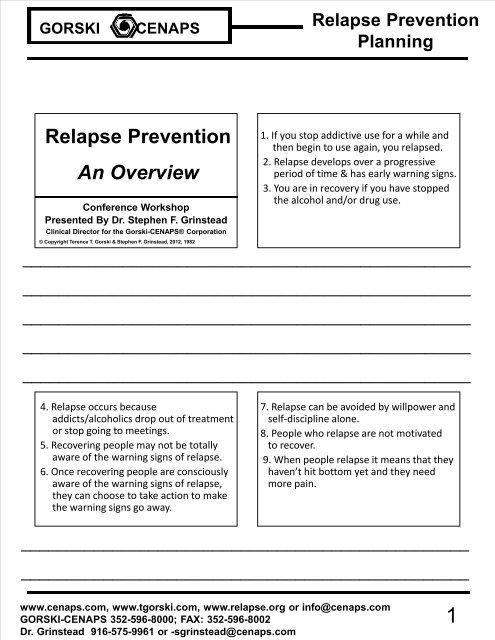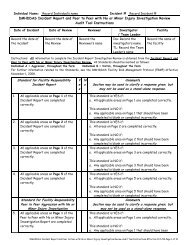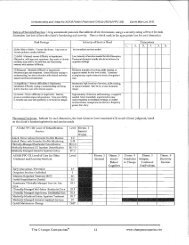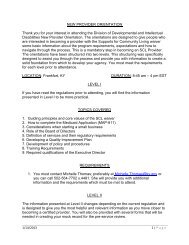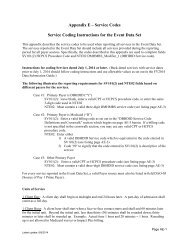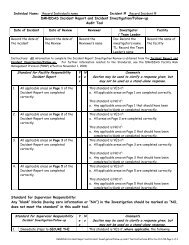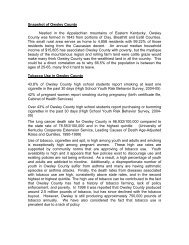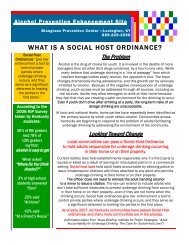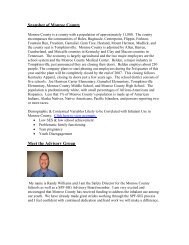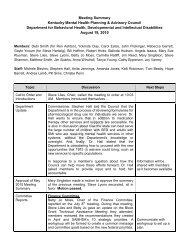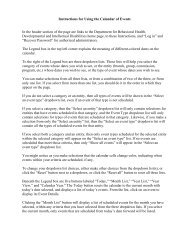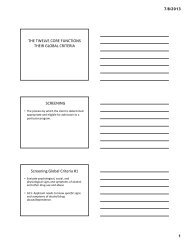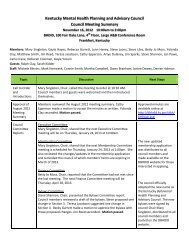Relapse Prevention An Overview
Relapse Prevention An Overview
Relapse Prevention An Overview
Create successful ePaper yourself
Turn your PDF publications into a flip-book with our unique Google optimized e-Paper software.
GORSKI<br />
CENAPS<br />
<strong>Relapse</strong> <strong>Prevention</strong><br />
Planning<br />
<strong>Relapse</strong> <strong>Prevention</strong><br />
<strong>An</strong> <strong>Overview</strong><br />
Conference Workshop<br />
Presented By Dr. Stephen F. Grinstead<br />
Clinical Director for the Gorski-CENAPS® Corporation<br />
© Copyright Terence T. Gorski & Stephen F. Grinstead, 2012, 1982<br />
1. If you stop addictive use for a while and<br />
then begin to use again, you relapsed.<br />
2. <strong>Relapse</strong> develops over a progressive<br />
period of time & has early warning signs.<br />
3. You are in recovery if you have stopped<br />
the alcohol and/or drug use.<br />
_________________________________________________<br />
_________________________________________________<br />
_________________________________________________<br />
_________________________________________________<br />
_________________________________________________<br />
4. <strong>Relapse</strong> occurs because<br />
addicts/alcoholics drop out of treatment<br />
or stop going to meetings.<br />
5. Recovering people may not be totally<br />
aware of the warning signs of relapse.<br />
6. Once recovering people are consciously<br />
aware of the warning signs of relapse,<br />
they can choose to take action to make<br />
the warning signs go away.<br />
7. <strong>Relapse</strong> can be avoided by willpower and<br />
self-discipline alone.<br />
8. People who relapse are not motivated<br />
to recover.<br />
9. When people relapse it means that they<br />
haven’t hit bottom yet and they need<br />
more pain.<br />
_________________________________________________<br />
_________________________________________________<br />
www.cenaps.com, www.tgorski.com, www.relapse.org or info@cenaps.com<br />
GORSKI-CENAPS 352-596-8000; FAX: 352-596-8002<br />
Dr. Grinstead 916-575-9961 or -sgrinstead@cenaps.com<br />
1
GORSKI<br />
CENAPS<br />
<strong>Relapse</strong> <strong>Prevention</strong><br />
Planning<br />
Being in recovery requires…<br />
1. Understand addiction<br />
2. Apply that understanding to self<br />
3. Accept the painful feelings due to being addicted<br />
4. Having hope & belief recovery is possible<br />
and preferable<br />
5. Doing the B.P.S.S. recovery footwork needed<br />
6. Be abstinent — 60-90 Days<br />
Assessment & Treatment Planning<br />
Abuse Transition Stabilization Early Middle Late Ongoing<br />
DMC DMC/PRC PRC/RPC<br />
_________________________________________________<br />
_________________________________________________<br />
_________________________________________________<br />
_________________________________________________<br />
_________________________________________________<br />
RPT<br />
Coexisting Disorder Treatment<br />
Moving from stabilization<br />
to early recovery requires…<br />
• Identifying and managing stress<br />
• Normalizing and managing cravings<br />
• Identifying & managing Post Acute Withdrawal<br />
• Identifying and managing high risk situations<br />
My<br />
Addictive<br />
Thinking<br />
Returns<br />
© Terence T. Gorski, 2012, 1982<br />
The <strong>Relapse</strong> Cycle<br />
Moving from being stable in recovery to becoming dysfunctional<br />
and relapsing with alcohol or other drugs (AOD)<br />
HRS<br />
& Loss Of<br />
Control<br />
My Pain &<br />
Problems<br />
Increase<br />
AOD<br />
<strong>Relapse</strong><br />
My Old<br />
People,<br />
Places &<br />
Things<br />
I Commit I<br />
To Stabilize<br />
Return To<br />
Denial<br />
I Start<br />
Isolating<br />
I Return<br />
To My Old<br />
Behaviors<br />
I Stop<br />
Growing<br />
My Stress<br />
& Problems<br />
Increase<br />
My Old<br />
Thinking<br />
Returns<br />
_________________________________________________<br />
_________________________________________________<br />
www.cenaps.com, www.tgorski.com, www.relapse.org or info@cenaps.com<br />
GORSKI-CENAPS 352-596-8000; FAX: 352-596-8002<br />
Dr. Grinstead 916-575-9961 or -sgrinstead@cenaps.com<br />
2
GORSKI<br />
CENAPS<br />
<strong>Relapse</strong> <strong>Prevention</strong><br />
Planning<br />
<strong>Relapse</strong> Prone<br />
Evade/Deny<br />
Stress Builds<br />
Compulsive/Impulsive<br />
Avoidance Tactics<br />
Problems Multiply<br />
Evade/Deny ><br />
Recovery Prone<br />
Recognize<br />
Accept It’s OK<br />
Detach<br />
Ask For Help<br />
Respond w/ Action<br />
<strong>Relapse</strong> triggered by exposure to addictive/rewarding<br />
drugs<br />
<strong>Relapse</strong> triggered by exposure to conditioned cues<br />
from the environment<br />
<strong>Relapse</strong> triggered by exposure to stressful<br />
experiences involves brain stress circuits<br />
<br />
_________________________________________________<br />
_________________________________________________<br />
_________________________________________________<br />
_________________________________________________<br />
_________________________________________________<br />
A Withdrawal Symptom That Is…<br />
• Often Sub-Clinical (not easy to see)<br />
• Long-term (18 months to 3 years)<br />
• Previously Unidentified<br />
• Causes Dysfunction In Recovery<br />
People Have Difficulty With …<br />
• Thinking Clearly<br />
• Managing Feelings & Emotions<br />
• Remembering Things<br />
• Sleeping Restfully<br />
• Physical Coordination<br />
• Managing Stress<br />
_________________________________________________<br />
_________________________________________________<br />
www.cenaps.com, www.tgorski.com, www.relapse.org or info@cenaps.com<br />
GORSKI-CENAPS 352-596-8000; FAX: 352-596-8002<br />
Dr. Grinstead 916-575-9961 or -sgrinstead@cenaps.com<br />
3
GORSKI<br />
CENAPS<br />
<strong>Relapse</strong> <strong>Prevention</strong><br />
Planning<br />
1. Counseling (RPC)<br />
• Identifying and Managing<br />
• High Risk Situations<br />
• That Cause Craving<br />
2. Therapy (RPT)<br />
• Identifying and Managing<br />
• Early <strong>Relapse</strong> Warning Signs<br />
• That Lead To High Risk Situations<br />
3. Addiction Psychotherapy<br />
• Identifying and Managing<br />
• Core Personality Traits & Lifestyle Problems<br />
• That Cause Early <strong>Relapse</strong> Warning Signs<br />
Stuck Point in Recovery<br />
Irrational Thinking (Unnecessary Pain)<br />
Self-Defeating Behaviors<br />
(Unnecessary Problems)<br />
Addictive Thinking (AOD As Solution)<br />
Drug-Seeking Behavior (Acting Out)<br />
High Risk Situation (Activates Craving)<br />
Alcohol Or Other Drug (AOD) Use<br />
_________________________________________________<br />
_________________________________________________<br />
_________________________________________________<br />
_________________________________________________<br />
_________________________________________________<br />
Identifies <strong>An</strong>d Changes Core ...<br />
• Personality Factors<br />
• Lifestyle Factors<br />
... That Lead To A/D Use<br />
<strong>Relapse</strong> <strong>Prevention</strong> Counseling (RPC)<br />
Stabilizes Clients For<br />
<strong>Relapse</strong> <strong>Prevention</strong> Therapy (RPT)<br />
Stabilizes Clients For<br />
Addiction Psychotherapy<br />
1. Time Limited Abstinence Contract<br />
2. <strong>Relapse</strong> Intervention Plan<br />
3. High Risk Situation (HRS) Identification<br />
4. HRS Situations Mapping<br />
5. HRS Management<br />
6. HRS Decision Point Management<br />
7. Recovery Planning For Future HRS<br />
_________________________________________________<br />
_________________________________________________<br />
www.cenaps.com, www.tgorski.com, www.relapse.org or info@cenaps.com<br />
GORSKI-CENAPS 352-596-8000; FAX: 352-596-8002<br />
Dr. Grinstead 916-575-9961 or -sgrinstead@cenaps.com<br />
4
GORSKI<br />
CENAPS<br />
<strong>Relapse</strong> <strong>Prevention</strong><br />
Planning<br />
<strong>An</strong>y Experience<br />
That Can Activate The Urge<br />
To Use Alcohol Or Other Drugs<br />
In Spite Of the Commitment Not To<br />
High Risk Situations Activate Craving By<br />
A. Removing Recovery Support (Replacing Sober<br />
Reality Testing With Addictive<br />
Reality Testing)<br />
B. Creating Social Pressure to Use (AODs)<br />
C. Exposing To Addictive Substances (Witness<br />
Use; Accidental, Deceptive, or Medical Use)<br />
_________________________________________________<br />
_________________________________________________<br />
_________________________________________________<br />
_________________________________________________<br />
_________________________________________________<br />
1. The Brain Is A Habit Forming Computer<br />
• Automatic Thoughts<br />
• Automatic Feelings<br />
• Automatic Behaviors<br />
2. The Brain Organizes Information<br />
Using A Conceptual Pyramid<br />
Conceptual<br />
T<br />
H<br />
I<br />
N<br />
K<br />
I<br />
N<br />
G<br />
Title<br />
Description<br />
Situation Mapping<br />
Pyramid<br />
F<br />
E<br />
E<br />
LI<br />
N<br />
G<br />
S<br />
U<br />
RGES<br />
A<br />
CTIONS<br />
R<br />
EACTIONS<br />
Beliefs<br />
Perceptions<br />
Values<br />
_________________________________________________<br />
_________________________________________________<br />
www.cenaps.com, www.tgorski.com, www.relapse.org or info@cenaps.com<br />
GORSKI-CENAPS 352-596-8000; FAX: 352-596-8002<br />
Dr. Grinstead 916-575-9961 or -sgrinstead@cenaps.com<br />
5
GORSKI<br />
CENAPS<br />
<strong>Relapse</strong> <strong>Prevention</strong><br />
Planning<br />
1. Internal Factors<br />
1) Biological States<br />
2) Beliefs<br />
3) Perceptions<br />
4) Thoughts<br />
5) Feelings<br />
6) Urges<br />
7) Actions<br />
2. External Factors<br />
1) People<br />
2) Places<br />
3) Things<br />
4) Situations<br />
• Grave Illness<br />
• Death & Loss<br />
• Homelessness<br />
• Joblessness<br />
• Poverty<br />
1.People, Places, & Things That Center Around<br />
AOD Use<br />
2.Cues or Triggers Related To Past AOD Use That<br />
Activate Craving (Movies, Songs)<br />
3.Problems, Losses, Traumas in Recovery<br />
4.<strong>An</strong>ything That Causes A Personal Survival<br />
Threat By Challenging Survival Beliefs<br />
(I must/ Can’t Or Else I Will Die!)<br />
_________________________________________________<br />
_________________________________________________<br />
_________________________________________________<br />
_________________________________________________<br />
_________________________________________________<br />
1. Identify The High Risk Situation<br />
Are There <strong>An</strong>y Situations That Could Make You<br />
Want To Use AOD’s In Spite of Your<br />
Commitment Not To?<br />
2. Describe It (Write A Description)<br />
Tell Me What Happened or Could Happen?)<br />
3. Label It (Give It A Title)<br />
Let’s Name The Situation With A Word Or Short<br />
Phrase To Help Us Remember & Talk About It.<br />
1. Unpleasant Emotions<br />
2. Physical Discomfort<br />
3. Pleasant Emotions<br />
4. Testing Personal Control<br />
5. Urges & Temptations<br />
6. Conflict With Others<br />
7. Social Pressure to Drink<br />
8. Pleasant Times With Others<br />
Internal<br />
External<br />
Source: <strong>An</strong>nis, H.M. Inventory of Drinking Situations. Toronto: Addictions Research<br />
Foundation of Ontario, 1982; Marlatt & Gordon, <strong>Relapse</strong> <strong>Prevention</strong>, 1980<br />
_________________________________________________<br />
_________________________________________________<br />
www.cenaps.com, www.tgorski.com, www.relapse.org or info@cenaps.com<br />
GORSKI-CENAPS 352-596-8000; FAX: 352-596-8002<br />
Dr. Grinstead 916-575-9961 or -sgrinstead@cenaps.com<br />
6
GORSKI<br />
CENAPS<br />
<strong>Relapse</strong> <strong>Prevention</strong><br />
Planning<br />
What Situations Should Be Mapped:<br />
1. Immediate Future High Risk Situation<br />
2. Past High Risk Situations<br />
• That Are Similar To The Identified HRS<br />
• One That Ended In A/D Use<br />
• One That Was Managed Without A/D Use<br />
1. Describe The Exact Sequence<br />
Of Events <strong>An</strong>d Behaviors<br />
• Go Visual, See It In Your Mind<br />
2. Clarify All Aspects Of the Situation<br />
• Who? What? When? Where? Why? How?<br />
3. What Did You Want To Accomplish?<br />
• Getting Into Bad Situations For Good Reasons<br />
4. Did You Get What You Wanted?<br />
• What Did It Cost?<br />
_________________________________________________<br />
_________________________________________________<br />
_________________________________________________<br />
_________________________________________________<br />
_________________________________________________<br />
Beginning<br />
1. What Did You Want To Accomplish By Managing The<br />
Situation The Way You Did?<br />
2. Did You Get What You Wanted?<br />
• Yes or No. To What Degree (0 – 10)<br />
3. What Was The Price You Paid?<br />
4. What Could You Do Differently To Get Those Needs<br />
Met In A Healthy Way?<br />
Sequence<br />
Of Events<br />
Get Invited To Wedding<br />
Decide To Go<br />
Show Up Alone<br />
Sit With Family Who Drink<br />
Refuse To Drink<br />
Get Criticized & Feel Bad<br />
Stay Late<br />
Start Drinking<br />
Ending<br />
_________________________________________________<br />
_________________________________________________<br />
www.cenaps.com, www.tgorski.com, www.relapse.org or info@cenaps.com<br />
GORSKI-CENAPS 352-596-8000; FAX: 352-596-8002<br />
Dr. Grinstead 916-575-9961 or -sgrinstead@cenaps.com<br />
7
GORSKI<br />
CENAPS<br />
<strong>Relapse</strong> <strong>Prevention</strong><br />
Planning<br />
1. Identify 3 Decision Points Where More Effective<br />
Strategies Could Be Used<br />
• Near The Beginning<br />
• Near The Middle<br />
• Near The End<br />
2. What Can You Do Differently At Each Decision<br />
Point<br />
3. How Will That New Behavior Change The<br />
Outcome (Best? Worst? Most Likely?)<br />
4.Explore How To Responsibly Avoid The<br />
Situation.<br />
5.Explore How Stop AOD Use Quickly Should It<br />
Occur As A Result Of The Situation<br />
_________________________________________________<br />
_________________________________________________<br />
_________________________________________________<br />
_________________________________________________<br />
_________________________________________________<br />
How Can You …<br />
• Avoid The Situation?<br />
• Change Something Near The Beginning?<br />
• Change Something Near The Middle?<br />
• Change Something Near The End?<br />
• Stop AOD Use Quickly Should It Occur?<br />
Beginning<br />
Sequence<br />
Of Events<br />
Get Invited To Wedding<br />
Decide To Go<br />
Show Up Alone<br />
Sit With Family Who Drink<br />
Refuse To Drink<br />
Ending<br />
Get Criticized & Feel Bad<br />
Stay Late<br />
Start Drinking<br />
_________________________________________________<br />
_________________________________________________<br />
www.cenaps.com, www.tgorski.com, www.relapse.org or info@cenaps.com<br />
GORSKI-CENAPS 352-596-8000; FAX: 352-596-8002<br />
Dr. Grinstead 916-575-9961 or -sgrinstead@cenaps.com<br />
8
GORSKI<br />
CENAPS<br />
<strong>Relapse</strong> <strong>Prevention</strong><br />
Planning<br />
#1<br />
Get Invited To Wedding<br />
Decide To Go<br />
Decide Not To Go<br />
#2<br />
Show Up Alone<br />
Go With A Sober Friend<br />
Sit With Family Who Drink<br />
#3<br />
Refuse To Drink<br />
Sit With Safe Friend<br />
Get Criticized & Feel Bad<br />
Sequence<br />
Stay Late<br />
Of Events #4 Go Home Early<br />
Start Drinking<br />
Thinking Management<br />
At The First Decision Point ...<br />
1.What do you tend to think that could make you<br />
want to use AOD’s in this situation?<br />
2.What’s another way of thinking that could help<br />
you manage the situation without using AOD’s?<br />
_________________________________________________<br />
_________________________________________________<br />
_________________________________________________<br />
_________________________________________________<br />
_________________________________________________<br />
Get Invited To Wedding<br />
#1<br />
Decide To Go<br />
Decide Not To Go<br />
Addictive Thinking<br />
1. I have to go or my family will<br />
hate me!<br />
2. I should be able to go without<br />
wanting to drink!<br />
3. If I do have a drink or two it<br />
won’t be that bad.<br />
Sober Thinking<br />
1. My family loves me & wants me<br />
sober so they’ll understand.<br />
2. At this stage of my recovery its<br />
normal to have cravings around<br />
people who are drinking.<br />
3. Once I start, I’m not sure I’ll be<br />
able to stop before I have<br />
serious problems.<br />
Get Invited To Wedding<br />
#1<br />
Decide To Go<br />
Decide Not To Go<br />
Addictive Thinking<br />
1. I have to go or my family will<br />
hate me!<br />
Sober Thinking<br />
1. I don’t have to go. I need to<br />
make a choice based on what’s<br />
best for me.<br />
2. I can’t control how my family<br />
feels about my decisions.<br />
3. It’s OK if my family doesn’t like<br />
my decision, they’ll still love me.<br />
4. If my family loves me & wants<br />
me sober they’ll understand.<br />
_________________________________________________<br />
_________________________________________________<br />
www.cenaps.com, www.tgorski.com, www.relapse.org or info@cenaps.com<br />
GORSKI-CENAPS 352-596-8000; FAX: 352-596-8002<br />
Dr. Grinstead 916-575-9961 or -sgrinstead@cenaps.com<br />
9
GORSKI<br />
CENAPS<br />
<strong>Relapse</strong> <strong>Prevention</strong><br />
Planning<br />
Get Invited To Wedding<br />
#1<br />
Decide To Go<br />
Decide Not To Go<br />
Addictive Thinking<br />
1. I have to go or my family will<br />
hate me!<br />
2. I should be able to go without<br />
wanting to drink<br />
Sober Thinking<br />
1. No I shouldn’t. At this stage of<br />
my recovery its normal to have<br />
cravings when I’m around<br />
people who are drinking.<br />
2. If I go I’ll be putting myself in a<br />
really tough situation. I don’t<br />
need that right now.<br />
3. If I start drinking the whole<br />
family will suffer, so its best not<br />
to go<br />
Get Invited To Wedding<br />
#1<br />
Decide To Go<br />
Decide Not To Go<br />
Addictive Thinking<br />
1. I have to go or my family will<br />
hate me!<br />
2. I should be able to go without<br />
wanting to drink<br />
3. If I do have a drink or two it<br />
won’t be that bad.<br />
Sober Thinking<br />
1. If I start drinking it can cause<br />
very bad problems.<br />
2. When I drink my judgment &<br />
impulse control disappear, I<br />
usually keep going until I get<br />
drunk, I need to drink the<br />
morning after, and I quickly go<br />
back into old and very<br />
destructive ways of living.<br />
3. If I start drinking I could easily<br />
loose control & destroy my life.<br />
_________________________________________________<br />
_________________________________________________<br />
_________________________________________________<br />
_________________________________________________<br />
_________________________________________________<br />
Feeling Management<br />
At The First Decision Point ...<br />
1. What do you tend to feel that makes<br />
you want to use AOD’s?<br />
2. How can you recognize & label<br />
those feelings?<br />
Feeling + Addictive Thinking = Craving<br />
Strong<br />
<strong>An</strong>gry<br />
Happy<br />
Safe<br />
Fulfilled<br />
Proud<br />
Lonely<br />
Peaceful<br />
or Weak ........... Intensity = ___<br />
or Caring ........ Intensity = ___<br />
or Sad ............. Intensity = ___<br />
or Threatened . Intensity = ___<br />
or Frustrated ... Intensity = ___<br />
or Ashamed .... Intensity = ___<br />
or Connected .. Intensity = ___<br />
or Agitated...... Intensity = ___<br />
_________________________________________________<br />
_________________________________________________<br />
www.cenaps.com, www.tgorski.com, www.relapse.org or info@cenaps.com<br />
GORSKI-CENAPS 352-596-8000; FAX: 352-596-8002<br />
Dr. Grinstead 916-575-9961 or -sgrinstead@cenaps.com<br />
10
GORSKI<br />
CENAPS<br />
<strong>Relapse</strong> <strong>Prevention</strong><br />
Planning<br />
Feeling Management<br />
At The First Decision Point ...<br />
3. Identify Addictive Feeling Management Strategies<br />
• What do you do to manage these feelings that makes you want<br />
to use AOD’s?<br />
4. Identify New and More Effective Feeling Management<br />
Strategies<br />
• What could you do differently that would help you to manage<br />
these feelings more effectively?<br />
Get Invited To Wedding<br />
#1<br />
Decide To Go<br />
Decide Not To Go<br />
Unmanageable Feeling<br />
1. Feeling: Fear<br />
2. Activating Thought: My Family<br />
Will Hate Me!<br />
3. Activating Behavior: Always<br />
Having To Do What My Family<br />
Wants<br />
New Management Strategy<br />
1. Feeling: Fear.<br />
2. New Thought: My Family will<br />
understand & support my<br />
decision.<br />
3. New Behavior: Respectfully<br />
refusing to do what’s expecting<br />
& negotiating acceptable<br />
alternatives.<br />
_________________________________________________<br />
_________________________________________________<br />
_________________________________________________<br />
_________________________________________________<br />
_________________________________________________<br />
At The First Decision Point ...<br />
1. What do you do (What behaviors do you use) that<br />
increases the risk of using AOD’s?<br />
2. What could you do differently to avoid using AOD’s?<br />
Get Invited To Wedding<br />
#1<br />
Decide To Go<br />
Decide Not To Go<br />
Old Behavior<br />
1. Doing what I’m told,<br />
pretending to like it,<br />
feeling angry inside<br />
New Behavior<br />
1. Refusing to do what I’m told.<br />
2. Honestly telling people why<br />
3. Negotiating new alternatives for<br />
meetings the needs of all<br />
involved, including me.<br />
_________________________________________________<br />
_________________________________________________<br />
www.cenaps.com, www.tgorski.com, www.relapse.org or info@cenaps.com<br />
GORSKI-CENAPS 352-596-8000; FAX: 352-596-8002<br />
Dr. Grinstead 916-575-9961 or -sgrinstead@cenaps.com<br />
11
GORSKI<br />
CENAPS<br />
<strong>Relapse</strong> <strong>Prevention</strong><br />
Planning<br />
At The First Decision Point ...<br />
1. How do others respond to you in a way that<br />
increases the risk of using AOD’s?<br />
2. How could you invite others to do things that would<br />
keep you from using AOD’s?<br />
Lessons Learned …<br />
1. What’s The Most Important Thing You Learned By<br />
Doing This Situation Map?<br />
2. What Other High Risk Situations Are You Facing?<br />
3. How Can You Apply What You Learned To These<br />
Other Situations?<br />
_________________________________________________<br />
_________________________________________________<br />
_________________________________________________<br />
_________________________________________________<br />
_________________________________________________<br />
1. A Progression Of Problems ...<br />
• Interrelated<br />
• Causally Connected<br />
2. That Result In ...<br />
• Addictive Use<br />
• Physical/Psychological Collapse<br />
• Suicide<br />
3. Are Activated By<br />
Core Addictive Issues<br />
Core Psychological Issues<br />
4. <strong>An</strong>d Create ...<br />
Irrational Thoughts That Justify Addictive Use<br />
_________________________________________________<br />
_________________________________________________<br />
www.cenaps.com, www.tgorski.com, www.relapse.org or info@cenaps.com<br />
GORSKI-CENAPS 352-596-8000; FAX: 352-596-8002<br />
Dr. Grinstead 916-575-9961 or -sgrinstead@cenaps.com<br />
12
GORSKI<br />
CENAPS<br />
<strong>Relapse</strong> <strong>Prevention</strong><br />
Planning<br />
1. Developed In 1973 By Terence T. Gorski<br />
2. Expanded & Improved Over 40 Years<br />
3. Started With 118 <strong>Relapse</strong> Histories<br />
3.Patients Studied ...<br />
• Completed 21-28 Day Program<br />
• Recognized <strong>An</strong>d Accepted Addiction<br />
• Attempted To Use Their Recovery Program<br />
• Returned To Addictive Use<br />
_________________________________________________<br />
_________________________________________________<br />
_________________________________________________<br />
_________________________________________________<br />
_________________________________________________<br />
1. Internal Change<br />
2. Denial<br />
3. Avoidance <strong>An</strong>d Defensiveness<br />
4. Crisis Building<br />
5. Immobilization<br />
6. Confusion <strong>An</strong>d Overreaction<br />
7. Depression<br />
8. Loss of Control<br />
9. Break In Denial<br />
10. Option Reduction<br />
11. Addictive Use<br />
1. Title<br />
• A Word Or Phrase Summarizing The<br />
Meaning Of The Warning Sign<br />
2. Description<br />
• “I Know I Am In trouble With My Recovery When<br />
I… (The Primary Unmanageable Situation)”<br />
_________________________________________________<br />
_________________________________________________<br />
www.cenaps.com, www.tgorski.com, www.relapse.org or info@cenaps.com<br />
GORSKI-CENAPS 352-596-8000; FAX: 352-596-8002<br />
Dr. Grinstead 916-575-9961 or -sgrinstead@cenaps.com<br />
13
GORSKI<br />
CENAPS<br />
<strong>Relapse</strong> <strong>Prevention</strong><br />
Planning<br />
3. Thought Statement<br />
• “When I Experience This Warning Sign I Tend To<br />
Think (Primary Irrational Thought)”<br />
4. Feeling Statement<br />
• “When I Experience This Warning Sign I Tend To<br />
Feel (Primary Unmanageable Feeling)”<br />
5. Urge Statement<br />
• “When I Experience This Warning Sign I Have <strong>An</strong> Urge<br />
To (Primary Self-defeating Thing I Want To Do)”<br />
6. Action Statement<br />
• “When I Experience This Warning Sign What I Actually<br />
Do Is (Primary Self-defeating Thing I Actually Do)”<br />
_________________________________________________<br />
_________________________________________________<br />
_________________________________________________<br />
_________________________________________________<br />
_________________________________________________<br />
7. Social Reaction<br />
• “When I Experience This Warning Sign<br />
I Tend To Invite Others To Become Part Of My<br />
Problem By (Primary Self-defeating Relationship<br />
Problem)”<br />
Title: Can’t Say No<br />
Description:<br />
I Know I’m In Trouble With My Recovery When ...<br />
...I Can’t Stop Myself From Agreeing To Do Things<br />
That I Don’t Want To Do Or Have The Time <strong>An</strong>d<br />
Energy To Do<br />
_________________________________________________<br />
_________________________________________________<br />
www.cenaps.com, www.tgorski.com, www.relapse.org or info@cenaps.com<br />
GORSKI-CENAPS 352-596-8000; FAX: 352-596-8002<br />
Dr. Grinstead 916-575-9961 or -sgrinstead@cenaps.com<br />
14
GORSKI<br />
CENAPS<br />
<strong>Relapse</strong> <strong>Prevention</strong><br />
Planning<br />
When This Happens I Tend To ...<br />
Think:<br />
Feel:<br />
Urge:<br />
Action:<br />
If I don’t do it no one will like me<br />
I feel anxious and afraid<br />
I have an urge to please the<br />
person who is asking<br />
What I actually do is<br />
try to do it perfectly<br />
Social Reaction: When This Happens I Tend to:<br />
Invite Others To Become Part Of My Problem By ...<br />
• Hiding My Feeling<br />
• Doing What I Can To Please Them<br />
• Not Letting Them Know What I Am Really Feeling<br />
_________________________________________________<br />
_________________________________________________<br />
_________________________________________________<br />
_________________________________________________<br />
_________________________________________________<br />
Title: _______________________________________________________<br />
Description: I know I am in trouble with my recovery when I...<br />
_____________________________________________________________<br />
Thought: When I experience this warning sign I tend to think ...<br />
_____________________________________________________________<br />
Feeling: When I experience this warning sign I tend to feel ...<br />
_____________________________________________________________<br />
Urge: When I experience this warning sign I have an urge to...<br />
_____________________________________________________________<br />
Action: When I experience this warning sign what I actually do is ...<br />
_____________________________________________________________<br />
Reaction: I tend to invite others to become part of my problem by ...<br />
_____________________________________________________________<br />
1. Recovery Activities<br />
• Activities for managing this<br />
warning sign are ...<br />
2. Managing Thoughts<br />
• A new way of thinking is ...<br />
3. Managing Feelings<br />
• A new way of managing my feelings is...<br />
_________________________________________________<br />
_________________________________________________<br />
www.cenaps.com, www.tgorski.com, www.relapse.org or info@cenaps.com<br />
GORSKI-CENAPS 352-596-8000; FAX: 352-596-8002<br />
Dr. Grinstead 916-575-9961 or -sgrinstead@cenaps.com<br />
15
GORSKI<br />
CENAPS<br />
<strong>Relapse</strong> <strong>Prevention</strong><br />
Planning<br />
4. Managing The Urge<br />
• A new way of managing the action urge is...<br />
5. Changing Actions<br />
• A new way of acting is...<br />
6. Changing Relationships<br />
• A new way of inviting people to help me is…<br />
Title: _________________________________________________________<br />
Recovery Activities: Activities for managing this warning sign are ...<br />
_______________________________________________________________<br />
Managing Thoughts: A new way of thinking is ...<br />
_______________________________________________________________<br />
Managing Feelings: A new way of managing my feelings is...<br />
_______________________________________________________________<br />
Managing The Urge: A new way of managing the action urge is...<br />
_______________________________________________________________<br />
Changing Actions: A new way of acting is...<br />
_______________________________________________________________<br />
Changing Reactions: A new way of inviting people to help me is ...<br />
_______________________________________________________________<br />
_________________________________________________<br />
_________________________________________________<br />
_________________________________________________<br />
_________________________________________________<br />
_________________________________________________<br />
1. If you stop addictive use for a while and<br />
then begin to use again, you relapsed.<br />
2. <strong>Relapse</strong> develops over a progressive<br />
period of time & has early warning signs.<br />
3. You are in recovery if you have stopped<br />
the alcohol and/or drug use.<br />
4. <strong>Relapse</strong> occurs because<br />
addicts/alcoholics drop out of treatment<br />
or stop going to meetings.<br />
5. Recovering people may not be totally<br />
aware of the warning signs of relapse.<br />
6. Once recovering people are consciously<br />
aware of the warning signs of relapse,<br />
they can choose to take action to make<br />
the warning signs go away.<br />
_________________________________________________<br />
_________________________________________________<br />
www.cenaps.com, www.tgorski.com, www.relapse.org or info@cenaps.com<br />
GORSKI-CENAPS 352-596-8000; FAX: 352-596-8002<br />
Dr. Grinstead 916-575-9961 or -sgrinstead@cenaps.com<br />
16
GORSKI<br />
CENAPS<br />
<strong>Relapse</strong> <strong>Prevention</strong><br />
Planning<br />
7. <strong>Relapse</strong> can be avoided by willpower and<br />
self-discipline alone.<br />
8. People who relapse are not motivated<br />
to recover.<br />
9. When people relapse it means that they<br />
haven’t hit bottom yet and they need<br />
more pain.<br />
• www.drstevegrinstead.com/blog<br />
• www.cenaps.com<br />
• www.tgorski.com<br />
• www.addiction-free.com<br />
• www.relapse.org<br />
Dr. Grinstead’s Contact Information<br />
Email: sgrinstead@cenaps.com<br />
Phone: (916) 575-9961<br />
_________________________________________________<br />
_________________________________________________<br />
_________________________________________________<br />
_________________________________________________<br />
_________________________________________________<br />
_________________________________________________<br />
_________________________________________________<br />
www.cenaps.com, www.tgorski.com, www.relapse.org or info@cenaps.com<br />
GORSKI-CENAPS 352-596-8000; FAX: 352-596-8002<br />
Dr. Grinstead 916-575-9961 or -sgrinstead@cenaps.com<br />
17


